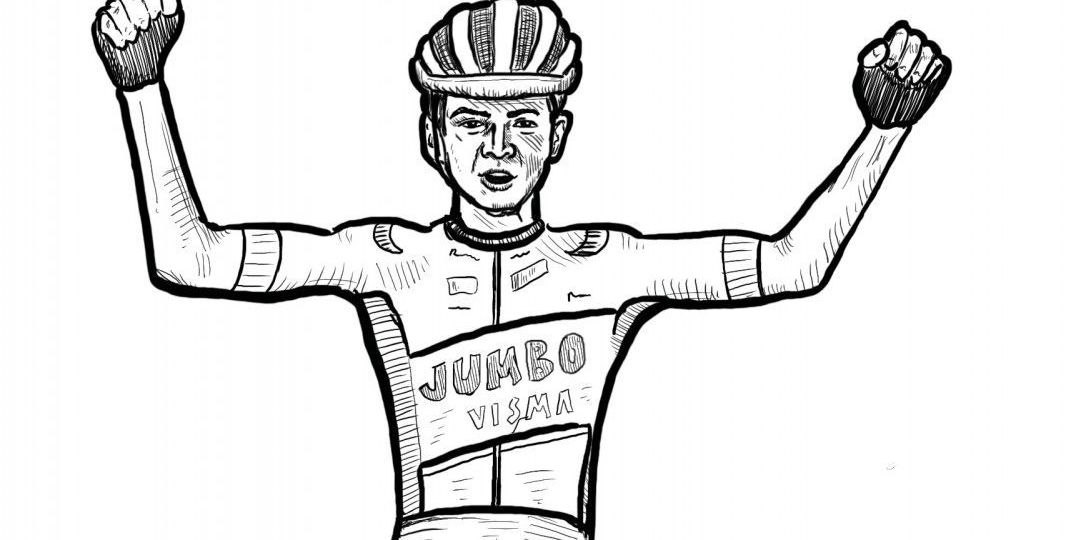
Graphic: Sean Rogers/The Olaf Messenger
For the first time in a decade, an American stands atop the cycling world.
On Sept. 17, Colorado native Sepp Kuss won the Vuelta a España, or Tour of Spain, becoming only the fourth American to win a cycling Grand Tour, and the first since Chris Horner conquered the same race in 2013.
To understand the mechanics of Kuss’s victory, it’s important to peek under the hood, or into the gears, of an overlooked sport in the United States.
The biggests events in cycling are the three Grand Tours: the Giro d’Italia or Tour of Italy, Tour de France, and the Vuelta. These are month-long affairs made up of 21 day-long races called stages which can span well over 100 miles, traveling from town to town across the host country. The clock is ticking throughout each stage as the rider with the fastest cumulative time across all stages emerges victorious as winners of the General Classification (GC).
Cycling, however, is a team sport and in the shadow of the GC superstars are the domestiques or “servants”: riders who position themselves in front of their team leaders to take the brunt of the wind and pace their teammates up dizzying mountain climbs.
Until the Vuelta in 2023, Sepp Kuss was a world class climber and a domestique to a tee, but never a winner per say. Labeled a kingmaker or super-domestique, the lanky Coloradan was instrumental to bringing six Grand Tour victories to his Jumbo-Visma team in the past four years while forgoing any individual glory.
Unique circumstances propelled Kuss from domestique to GC in the Spanish mountains. Entering the race, the Jumbo team championed a tandem of leaders featuring three time Vuelta winner Primož Roglič who had won the Giro in May, and Jonas Vingegaard who had claimed his second Tour de France victory that July.
While Jumbo was expected to excel, the race was turned on its head when Kuss was given free reign on stage six, winning the stage and vaulting himself near the top of the standings well ahead of his teammates. Kuss was expected to drop time to the GC favorites as the miles wore on, but 12 stages and thousands of feet of climbing later, Kuss clung to a 29 second advantage over Roglič and Vingegaard who sat second and third overall.
Kuss, unfortunately, could not count on the cooperation of his teammates, as the unwritten rules of cycling were scrapped entering stage 17. Vingegaard and Roglič attacked Kuss on the mountain top finish in an attempt to wrest the lead away from not only their own teammate, but a rider who had sacrificed himself to aid in each of their own Grand Tour victories.
Kuss was bent but didn’t break. When the dust settled, the American still clung to an eight second advantage over a second-placed Vingegaard and the following stage, perhaps due to the media firestorm that had been sparked in defense of Kuss, the Jumbo tactics shifted to helping Kuss retain his lead. Finally, on stage 21, Kuss rode into Madrid victorious.
One can take many perspectives in reflecting on this historic race. Jumbo-Visma can hang their helmets on becoming the first cycling team to sweep all three tours in the same year. Global cycling fans can appreciate the underdog triumph of a loyal domestique given a chance to shine. The cycling media can mine potential infighting drama of the Jumbo team for months to come. Kuss might see his victory as a fairy tale aberration and retire all future GC hopes in favor of his usual role.
But the U.S. should view this win as an opportunity to regain relevance in the world of competitive cycling once more. Now that the stain of Lance Armstrong and the doping era has largely been washed out of the sport’s greater narrative, a new generation of talents like Kuss can help define the next chapter in cycling and recapture the American audience. There’s certainly hope it won’t take another decade for an American rider to climb their way atop a Grand Tour podium.

